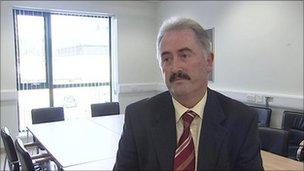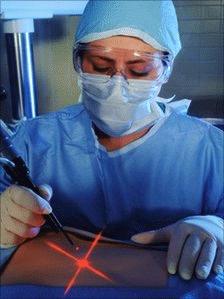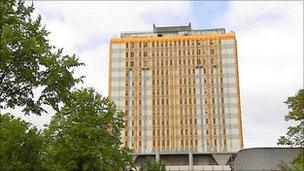The radical reform of Belfast A&E departments
- Published

Colm Donaghy said there wasn't enough staff to run three A&E departments efficiently
While managers at the Belfast health trust are describing the possible closure of the City Hospital's accident and emergency as "temporary", those who work on the front line are viewing the move as a more permanent one.
Some of those who work on both the Royal and City hospital sites, including nurses and junior doctors, have described the pace of change as alarming.
Speaking to the BBC, one doctor said: "While we all knew the system had to change, we didn't expect to be given less than two months notice. It's appalling."
'No other option'
The trust's chief executive, Colm Donaghy, has said that to ensure the safety of patients, the trust has no other option but to make contingency plans.
He added: "We will endeavour to find replacements for these two senior registrars who are planning to leave the City Hospital's accident and emergency department to become consultants.
"At this stage we have no-one to fill in behind them and that would affect patient safety. Therefore it is looking like the department will close come 30 September."
While senior officials are describing the move as unfortunate timing, realistically, it couldn't have come at a better time - as it gives those who have wanted to reshape the delivery of accident and emergency care in Belfast an excuse to do so.
Three accident and emergency departments in Belfast and within just three miles of each other has become the biggest headache for those who try to run the service.
Quite simply, there aren't enough senior doctors to run the shop, which, according to Colm Donaghy, is impacting on patient care.
"If we had a clean sheet of paper and were designing emergency services from the start, we would design one department," he said.
"The difference is we are not at that starting point - in fact all three departments are well utilized but there isn't the staff to run them efficiently.

A clearer picture of the scale and location cuts in the Northern Ireland health service is emerging
"So we have to make changes to ensure patients remain safe."
Open for business
So how will Northern Ireland's - and in particular Belfast's health service - look in five to 10 years' time?
Perhaps to feel really at the heart of the service, last month, management moved from their offices on the Knockbracken site to the City's tower block.
Sending out a clear message that "The City" is open for business, Colm Donaghy explained how services might appear in five years.
He said: "The vision for Belfast is that we would have a separation between emergency and elective care.
"As you know in the past, some of our planned operations have been cancelled or interrupted due to the high emergency intake.
"Instead we are trying to prevent interruptions. So the Royal site has been identified as the potential trauma centre in Belfast - the "hot site" where emergency work will be carried out.
"The City would become the elective centre - where planned operations would be conducted - for example in specialized areas such as cancer, renal and haematology.
"The Mater Hospital, in north Belfast, would become the regional centre for ophthalmology."
'Teething problems'
However, Mr Donaghy insisted that some acute services would remain at the City and at the Mater in the form of small intake centres which would also house some beds for emergency care.
Mr Donaghy said that the City's A&E had been earmarked for closure rather than the Mater Hospital as the emergency system in the north Belfast site was more sustainable.

The City Hospital A&E is to close temporarily in September
He said the staff shortages at the Mater would not impact in the same way as what was predicted to happen at the City Hospital.
While he admitted there would be be "teething problems" he insisted, that given time, the public in Belfast will benefit from the changes.
He added: "From October there will be ten consultants working in the Royal's emergency department.
"Patients will be seen quicker. A triage system will determine who is admitted to the Royal, to the City and indeed who will be cared for in the community instead."
With less than two months to prepare, management have still to engage with unions about the potential changes.
"There is no disagreement between us and the trade unions but what needs to happen now is meaningful discussion."
Change, especially in the health service, is always hard to swallow.
Colm Donaghy will be hoping that his sense of optimism is contagious and that his staff and the public don't remain immune to what ever else is being planned for the future.
- Published12 August 2011
- Published28 July 2011
- Published21 July 2011
- Published20 July 2011